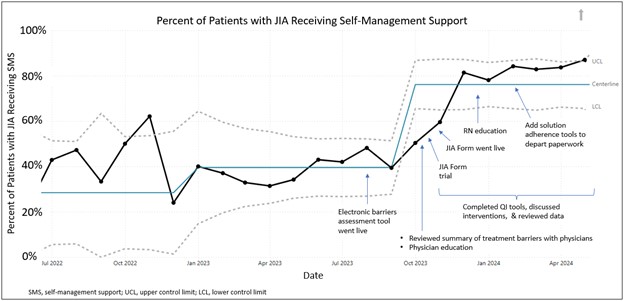Session Information
Session Type: Poster Session A
Session Time: 10:30AM-12:30PM
Background/Purpose: Self-management support (SMS) is one of the key elements of the Chronic Care Model as it is an important aspect of the care for patients with chronic conditions, including juvenile idiopathic arthritis (JIA). Patients with JIA and their families need to do many things to manage their disease including taking medications, getting infusions, obtaining frequent labs, attending rheumatology clinic visits, getting eye exams, and more. Through involvement with the Pediatric Rheumatology Care and Outcomes Improvement Network (PR-COIN), a North American learning health network, our site utilizes a barriers form to assess challenges in patients with JIA taking medications. We have several adherence tools that correspond to specific treatment barriers to provide patients and families and a Helping Hands handbook that provides additional resources. Despite having these resources, we only provided SMS to approximately 40% of patients with JIA in 2023. Our project aim was to increase the use of SMS from 40% to 75% by June 30, 2024. As the ultimate goal of SMS is to improve patient outcomes, we also aimed to increase the percent of patients with JIA in an inactive or low disease activity state by the 10-joint clinical Juvenile Arthritis Disease Activity Score (cJADAS10) from 75% to 77.5% by June 30, 2024.
Methods: Our team utilized quality improvement methodology including use of a process map, fishbone diagram, failure modes and effects analysis, and plan-do-study-act cycles. Our outcome measure is the percent of patients with oligoarticular or polyarticular JIA who achieve inactive or low disease activity criteria by cJADAS10 at their last clinic visit. Our process measure is the percent of patients with JIA who have SMS provided in the past 180 days, which includes completion of a barriers assessment tool or receiving a Helping Hands handbook or an adherence solution tool. A balancing measure was the median time in clinic from time to seeing the physician until checkout. Interventions included physician and nurse education. A new JIA form in our electronic health record was also implemented and allowed for electronic capture of SMS. Nurses and physicians also utilized electronic adherence solution tools to attach to patient’s clinic depart paperwork. We evaluated our data on control charts to assess for special cause.
Results: Data was reviewed monthly starting in July 2022 for our outcome and process measures. Our outcome measure performance did not significantly change with the percent of patients with JIA meeting this measure definition in May 2024 at 76.7%. However, our process measure of providing SMS increased significantly. A shift in our data was present with the average performance now at 76% and May 2024 performance at 87% (Figure 1). Our balancing measure data over the past 12 months has not significantly changed with median time of patient in the clinic room of 49.5 minutes.
Conclusion: Using quality improvement methodology, we were able to successfully increase the use of SMS for our patients with JIA and their families. We will continue to track this important process in our clinic in hopes to positively impact both disease activity and patient-reported outcomes in the future.
To cite this abstract in AMA style:
Harris J, Favier L, Fox E, Holland M, Hoffart C, Ibarra M, Jones J, Parish S, Remick-Erickson K, Cooper A. Improving Self-Management Support in Patients with Juvenile Idiopathic Arthritis [abstract]. Arthritis Rheumatol. 2024; 76 (suppl 9). https://acrabstracts.org/abstract/improving-self-management-support-in-patients-with-juvenile-idiopathic-arthritis/. Accessed .« Back to ACR Convergence 2024
ACR Meeting Abstracts - https://acrabstracts.org/abstract/improving-self-management-support-in-patients-with-juvenile-idiopathic-arthritis/

